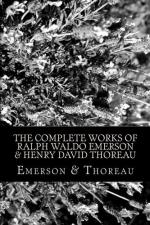|
This section contains 6,347 words (approx. 22 pages at 300 words per page) |

|
SOURCE: Westling, Louise H. “Pastoral Ambivalence in Emerson and Thoreau.” In The Green Breast of the New World: Landscape, Gender, and American Fiction, pp. 39-53. Athens: The University of Georgia Press, 1996.
In the following essay, Westling examines ideas about gender at the heart of the nature writings of Ralph Waldo Emerson and Henry David Thoreau.
What James Fenimore Cooper defined through fiction as white Americans' innocent inheritance of the landscape, Ralph Waldo Emerson and Henry David Thoreau addressed explicitly in Nature and Walden, through deliberate acts of self-evaluation and national mythmaking (Lewis, American Adam, 13-27; Nash 2-10, 67-95). Oelschlaeger claims that as Thoreau's reputation has grown, Emerson has come to be seen more as a popularizer of European ideas than as an original thinker (133). But among scholars of American literature Emerson has experienced renewed popularity as a deconstructive thinker in the past fifteen years. In any case Walden...
|
This section contains 6,347 words (approx. 22 pages at 300 words per page) |

|


